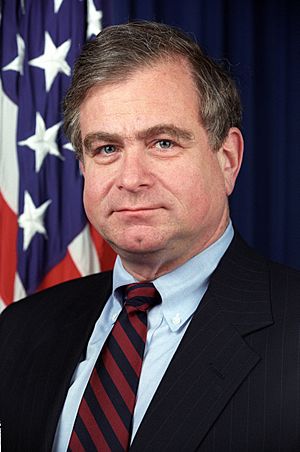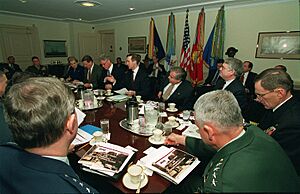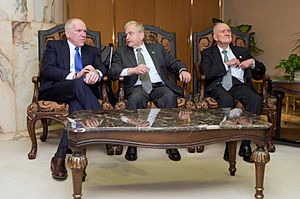Sandy Berger facts for kids
Quick facts for kids
Sandy Berger
|
|
|---|---|
 |
|
| 18th United States National Security Advisor | |
| In office March 14, 1997 – January 20, 2001 |
|
| President | Bill Clinton |
| Deputy | James Steinberg |
| Preceded by | Anthony Lake |
| Succeeded by | Condoleezza Rice |
| 19th United States Deputy National Security Advisor | |
| In office January 20, 1993 – March 14, 1997 |
|
| President | Bill Clinton |
| Preceded by | Jonathan Howe |
| Succeeded by | James Steinberg |
| Personal details | |
| Born |
Samuel Richard Berger
October 28, 1945 Millerton, New York, United States |
| Died | December 2, 2015 (aged 70) Washington, DC, United States |
| Political party | Democratic |
| Spouse | Susan Harrison |
| Children | 3 |
| Education | Cornell University (AB) Harvard University (JD) |
Samuel Richard "Sandy" Berger (October 28, 1945 – December 2, 2015) was a lawyer who worked for the United States government. He served as the 18th National Security Advisor for President Bill Clinton. This important role lasted from 1997 to 2001. Before that, he was the Deputy National Security Advisor for the Clinton administration from 1993 to 1997.
Contents
Early Life and Education
Sandy Berger was born into a Jewish family in Millerton, New York. His parents owned a store there. He finished high school in 1963.
He then went to Cornell University, where he earned his Bachelor of Arts degree in government in 1967. Later, he studied law at Harvard Law School. He received his law degree in 1971.
At Cornell, Berger was part of a group called Quill and Dagger. He met Bill Clinton while working on George McGovern's presidential campaign in 1972. They became good friends. Berger later encouraged Clinton to run for president.
After the campaign, Berger worked in different government jobs. He was an assistant to the Mayor of New York City John Lindsay. He also worked for U.S. Senator Harold Hughes and Congressman Joseph Resnick. From 1977 to 1980, he helped plan policies for the U.S. Department of State. This was during the Carter administration.
After leaving the State Department, Berger joined a law firm called Hogan & Hartson. He helped the firm grow its international law work. He even opened their first offices in London and Brussels.
Working with President Clinton

Sandy Berger was a key advisor to Governor Clinton during his presidential campaign. He also helped with the national security part of the 1992 Clinton-Gore transition.
Berger spent eight years working for the National Security Council. First, he was the deputy national security advisor from 1993 to 1997. Then, he became the Assistant to the President for National Security Affairs from 1997 to 2001.
Berger was very important in shaping the foreign policy of the Clinton Administration. He helped the administration work towards goals like promoting "democracy, shared prosperity, and peace." President Clinton said that Berger was very smart at understanding situations and figuring out what to do. His skills were helpful in many places, including Latin America, the Balkans, Northern Ireland, and the Middle East.
Some important things that happened during Berger's time included helping Mexico's economy in 1995. He also helped expand NATO and supported Operation Desert Fox. He played a role in the Dayton Accords, which ended a conflict in Bosnia. He also helped with the NATO bombing campaign against Yugoslavia. The Good Friday Agreement, which brought peace to Northern Ireland, was also a key achievement. Berger also worked on the policy of engaging with People's Republic of China. He believed that China was brought into the international system through trade and economics during the 1990s.
In 1999, Berger gave important advice to President Clinton during a serious situation. He helped negotiate with Pakistan's prime minister, Nawaz Sharif. This helped prevent a possible nuclear war with India over Kashmir.
Berger also advised the President after the Khobar Towers bombing. He helped with responses to the terrorist bombings of American embassies in Kenya and Tanzania. In the last years of the Clinton administration, fighting terrorism became the top foreign policy goal. Berger told his successor, Condoleezza Rice, that terrorism, especially al-Qaeda, would be the main issue she would face.
After Government Service

After leaving the Clinton Administration, Berger became the chairman of Stonebridge International. This was a company he started in 2001. It helped companies grow into new markets like Brazil, China, India, and Russia. In 2009, Stonebridge International joined with another firm to form Albright Stonebridge Group.
Berger also served on many important boards and advisory groups. He was an advisory board member for the Partnership for a Secure America. This group works to bring people together on national security and foreign policy. He also advised the International Crisis Group and World Food Program USA. He was a foreign policy advisor to Senator Hillary Clinton during her 2008 presidential campaign.
Personal Life and Passing
Sandy Berger lived in Washington, D.C.. He was married to Susan Harrison Berger, and they had three children.
He passed away from cancer in Washington, D.C., on December 2, 2015. He was 70 years old.
Awards and Recognition
In November 2015, the Japanese government honored Sandy Berger. He received the Grand Cordon of the Order of the Rising Sun. This award recognized his efforts to build a strong friendship between the United States and Japan. He also gave legal advice to the Embassy of Japan in Washington, D.C..
On December 1, 2015, World Food Program USA gave Sandy Berger its first Global Humanitarian Award. This was to honor his many years of helping families in need around the world. They also created the Samuel R. Berger Humanitarian Fund. This fund will support groups working to end hunger globally.
In 2000, Tel Aviv University in Israel gave Berger an honorary degree.
See also
- History of the United States National Security Council 1993–present
- Iraq disarmament timeline 1990–2003
- Mary McCarthy (CIA)
 In Spanish: Sandy Berger para niños
In Spanish: Sandy Berger para niños
 | Madam C. J. Walker |
 | Janet Emerson Bashen |
 | Annie Turnbo Malone |
 | Maggie L. Walker |

